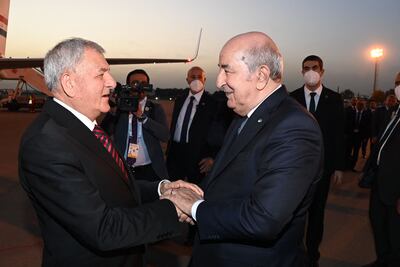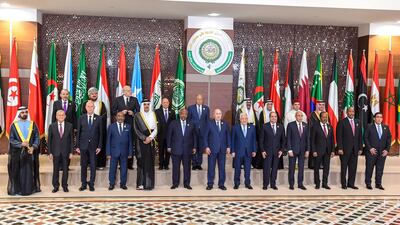Arab leaders meeting in Algeria for their first summit since 2019 renewed their support to the Palestinians, pledging to seek full UN membership for Palestine and to support their effort to hold Israel accountable for its “crimes”.
In a final communique issued at the end of the two-day summit, the leaders also rejected “foreign interference” in the domestic affairs of their nations ― a thinly veiled reference to Iran and Turkey ― and stated their support for the legitimate government in Yemen fighting the Iranian-backed Houthi rebels.
They also called for a “Libyan solution” to the crisis in the North African state and said they hoped elections would soon be held to achieve “permanent political stability”. Divisions and fighting among rival factions meant that elections that had been scheduled for last December were never held.
It made no mention of Turkey's military presence in Libya or Ankara's recent deal with the Tripoli-based government for joint, offshore exploration for oil and gas in the Mediterranean.
Egypt and its ally Greece ― both at odds with Ankara ― condemned the deal and accused Turkey of fuelling tension in the energy-rich East Mediterranean.
Turning to Syria, the communique said Arab nations would collectively contribute to the search for a political settlement in the war-ravaged nation, which was thrown out of the Arab League a decade ago for its bloody crackdown on a peaceful, pro-democracy uprising.
The communique, called the “Algeria Declaration”, was issued hours after Palestinian President Mahmoud Abbas made an impassioned plea for help on the second and final day of the summit, urging participants to “hurry to the rescue of Jerusalem”.
As expected, the gathering, referred to as the “Palestine summit” by its Algerian hosts, went into a familiar mode on Wednesday, with expressions of support to and solidarity with the Palestinians in their decades-old conflict with Israel.
There were mentions in speeches by the Arab leaders and in the final communique of other issues such as the food shortages facing their nations, climate change and the damaging fallout from the Russia-Ukraine war, but the Palestinian question, which has bedevilled the Arab world for more than 70 years, remained at centre stage.
“Rush to the rescue of Jerusalem,” said Mr Abbas in his address, explaining that Israel was systematically erasing the Palestinian identity of the eastern part of the city and taking quick and long strides in giving it a Jewish character.
Turning to what he called Israel's intransigence and its disregard for the international community's resolutions on the Palestinian-Israeli conflict, Mr Abbas threatened to order a halt to contacts between the Palestinian Authority, which controls parts of the West Bank, and Israel.
“I must tell you in all honesty that Israel, the occupying state … has left us with no choice but to review the entirety of our relations with it,” he said. He also called for the creation of an Arab commission mandated with “exposing” Israeli crimes and securing full UN membership for Palestine.
Palestine currently has a non-member observer state at the UN but Israel and its allies including the US have rejected its attempts to join UN bodies and push for full membership.
He also wants the proposed commission to lobby for the convening of an international peace conference on Palestine and to prevent foreign countries from moving their embassies from Tel Aviv to Jerusalem.
President Abdel Fattah El Sisi restated Egypt's support for the Palestinians, declaring Cairo's commitment to a settlement based on a two-state solution that includes an independent Palestinian state with East Jerusalem as its capital.
The two leaders spoke as the prospect of Benjamin Netanyahu's return to power in Israel at the head of one of the most right-wing coalitions in Israeli history prompted concern among Palestinians who believe it could be the prelude to an escalation of conflict.
The fanfare surrounding Mr Netanyahu's performance in Tuesday's election is set against the backdrop of the deadliest spell of violence in years between Israel and the Palestinians, whose hopes of statehood appear as distant as ever with Middle East peacemaking mired in uncertainty.
The Arab summit, the first in three years, comes amid rising food and energy costs, shortages, drought in some Arab countries and the soaring cost of living across much of the Middle East and Africa.
The gathering coincided with the 68th anniversary of Algeria's war of independence against France and as an opportunity for the energy-rich North African nation — Africa's largest by territory — to showcase its place at the forefront of Middle East diplomacy.
The last Arab summit was held in Tunisia in 2019. The coronavirus pandemic meant that Arab leaders could not meet in 2020 and 2021.
UN Secretary General Antonio Guterres, attending as an observer, said the region must do all in its power to ensure the economic and political crises do not escalate.
“We must do all we can to ensure the continued success of the Black Sea Grain Initiative to provide relief to those in need, including countries in the Middle East and North Africa relying on accessible and affordable food and fertilisers — both from Ukraine and the Russian Federation,” Mr Guterres said on Tuesday.
Russia's war in Ukraine has enabled Algeria to become a main oil and gas exporter to western Europe, raising its international standing.
The conflict has created an energy crisis across Europe.
Tunisia's President Kais Saied, the departing president of the Arab League, said the Russia-Ukraine conflict had resulted in a global food crisis exacerbated by climate change and natural disasters.
Earlier on Thursday, Iraqi Foreign Minister Fuad Hussein said the outcome of the summit would mean a strong response towards Iran and Turkey's interference in his country's internal affairs.
“The Iranian and Turkish interferences in Iraq are not accepted and will have a regional response if it continues,” he said. “We are seeking to resolve the contentious points with Iran and Turkey through dialogue.”

Mr Hussein said Iraq refuses to be an “arena for regional and international conflicts” and the new Baghdad government wanted “to continue to improve relations with the region”.
Mostafa Haroon is a special correspondent for The National in Algiers. Hamza Hendawi reported from Cairo.













































